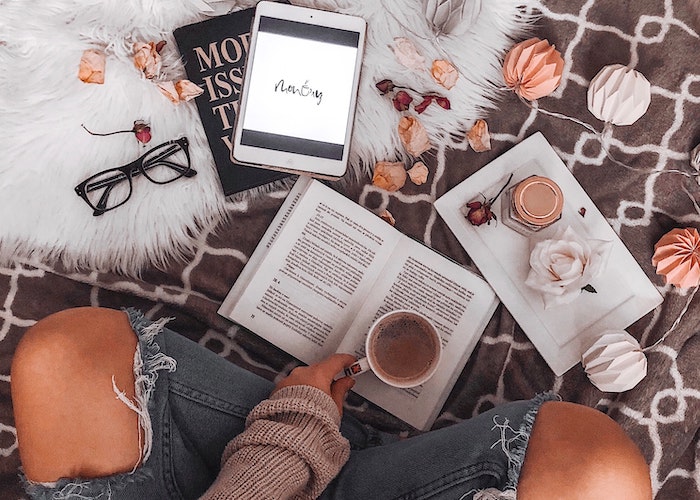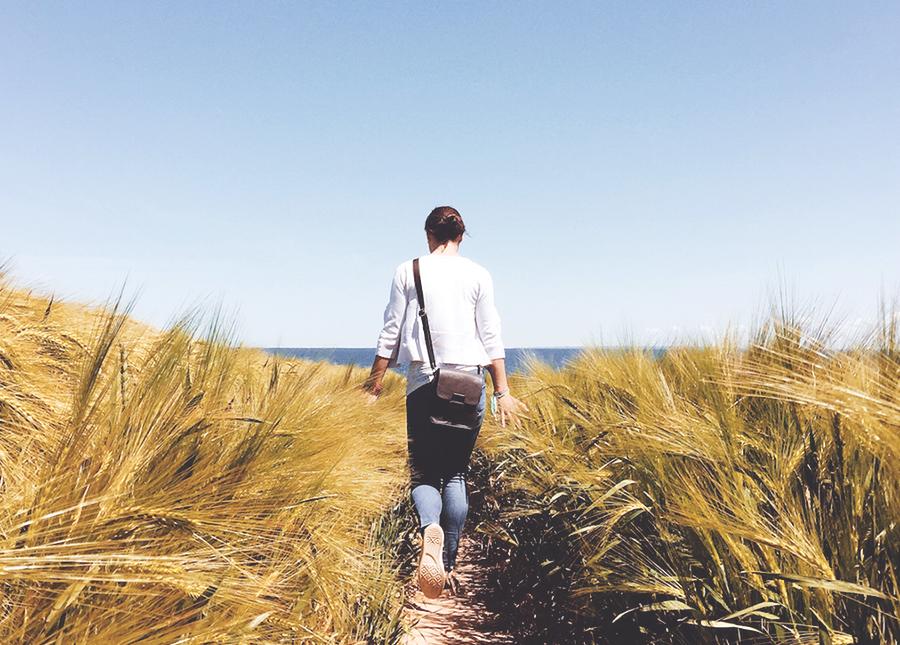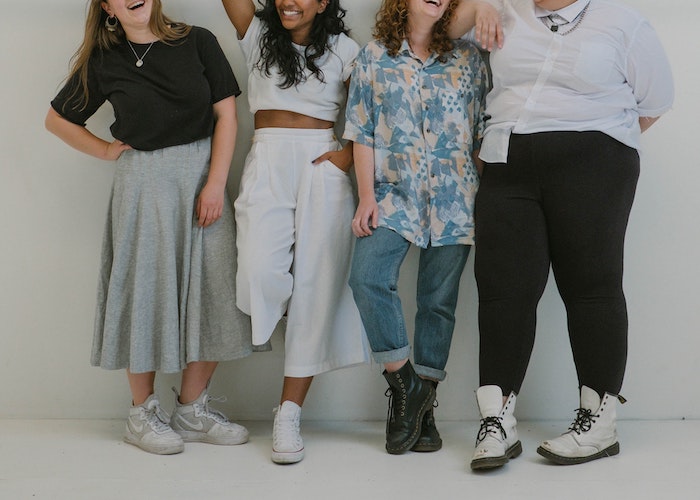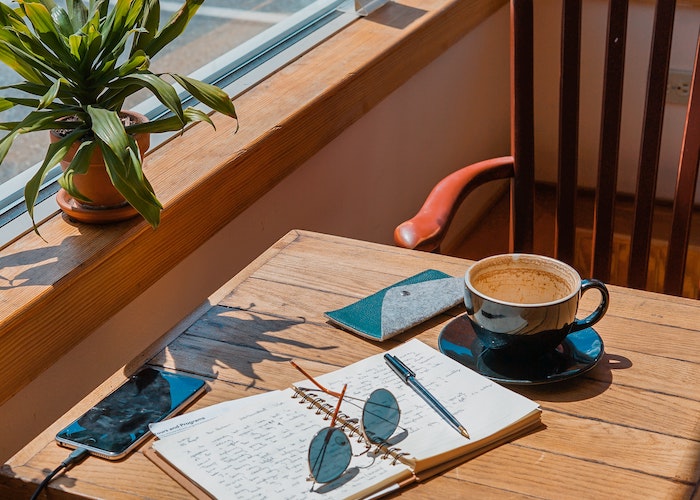11 Self-Sabotaging Habits I Swapped Out For Self-Love Instead

In my mid to late 20s, I had subscribed to a very specific vision of success for myself.
“Successful Me” would have a high-paying job, a wardrobe filled with unique and tailored clothes that fit me perfectly, and a planner filled with important dates. I’d know how to set boundaries, have a healthy relationship with everyone and everything, and leverage my instinct as well as my vulnerabilities. And at 30, I’d finally be resoundingly confident.
It took an unfulfilling job and a pandemic to make me realize just how self-sabotaging my way of thinking was. As I approach the one year anniversary of my life blowing up in my face, I’m lucky to reflect on ways I’ve swapped out some of this behavior with acts of self-love and appreciation, instead. As it turns out, when you celebrate and appreciate yourself, you create a sturdier emotional foundation so that you can actually thrive!
These are some of the ways I sabotaged my happiness, well-being, and sanity — and how I was able to curb these habits for way healthier ones.
1. Not believing in my own skills and achievements
I have this annoying tendency of doubting myself and, when I’m not assuming I’m a total failure, I’m worried I’m not working hard enough or doing my absolute best work. It doesn’t matter how great my results are, or how well numbers and data speak for themselves, I’ll convince myself I’m the worst. Imposter syndrome is a mother. But I’m working on this! I’m relying less and less on colleagues, friends, and family to reassure me that I’m good at what I do, and relying more on myself and my convictions that I know I’m good at what I do (and that it’s not just because of luck that I’ve been able to achieve what I’ve been able to achieve). I’m not going to lie: This is the hardest habit to break. Mentally coaxing yourself that your talents, instincts, and knowledge are real can be so, so hard. I’m slowly breaking through to myself, but I have more days in which I believe in myself than not.
2. Withholding breaks from myself because I don’t “deserve” them
I’ve recently cut back a bit on my side gigs. Starting back in November, my job became even more demanding, and I just didn’t have the mental capacity to keep working until midnight every night and working from morning to evening every weekend. I was burnt, angry about everything and anything, and exhausted. Worst of all, working so much had made it so I didn’t even know how to take breaks anymore. When I first stopped working full days on the weekend, I thought I had a fever. Seriously. After an hour spent on the couch, I genuinely thought I was sick (I wasn’t). My body and brain were so used to just non-stop plugging away, that they were confused when I didn’t have work to do. I’ve been better at setting work boundaries for myself, and am better at identifying when I’ve hit a wall and need to take some time for myself. It’s not perfect (bills still need to get paid), but I’m finding a way to make extra money without totally overworking myself.
3. Comparing myself to others
After way too much social media stalking, I realized that this was making me feel way worse than I thought. I knew it was a devastating habit, but I didn’t understand just how emotionally toxic it was until one night I burst into tears after scrolling through someone’s impossibly chic feed and coming across a job announcement on Twitter. The “some personal news” wording just set me off, making me feel like someone else’s success and put togetherness meant I’d never be successful or put together (which is so wrong!). I’ve cut back on social media in general, and when I do see someone either living their best, jealousy-inducing life or rightfully bragging about a new job, I check myself. My happiness isn’t dependent on other people’s happiness.
4. Working through lunch to feel more productive
For a TFD story, I challenged myself to take a 30-minute lunch break every day. Normally, I’d work through lunch because I’d convince myself that I wouldn’t get everything on my to-do list done, or that my boss would Slack me while I’d be away and think I was lazy or unresponsive. And by evening, I’d be unsurprisingly exhausted and have no mental energy to do anything for myself except re-watch episodes of SATC. What started out as a challenge, became a routine I allowed myself to have. In fact, I give myself 40 minutes free from screens now, and I use that time to walk my dog and thoroughly enjoy a meal without getting crumbs lodged in between my laptop keyboard. And I’m way more productive, too.
5. Saying “yes” to everything
A part of the boundary-learning is not taking on projects I know I don’t have the mental capacity for. A couple of months ago, I started referring other colleagues after telling clients I didn’t have the bandwidth at the moment, but to please keep me in mind. It was terrifying — what if they never spoke to me again? What if they thought I was being rude and neglectful? At the time, my exhaustion overtook my fears of losing out on future work. I was tired, depressed, and burnt out now. Not everyone has the ability to say “no.” Like I said, I still panic about it, since some gigs I can’t afford not to have. But I also knew something had to change. I had to re-prioritize my life, and the amount I was doing wasn’t healthy, and it was starting to have an impact on the quality of what I was submitting. If I didn’t cut back, I’d eventually lose out on work in different ways.
6. Vaping
This is the first time I’ve ever written about this, and I am honestly super embarrassed about it (although I know vaping works for a lot of people who are trying to quit smoking actual cigarettes). I had occasionally vaped before the pandemic — smoking a Juul was a soothing bad habit I’d indulge in from time to time, and it didn’t even feel (or taste or smell) gross. It’s unclear what kind of long-term side effects the Juul/vape pens leave behind, but I convinced myself it had to be better than smoking a cigarette. As soon as the pandemic hit and I lost my job, the vaping increased. And I just kept doing it until I didn’t know how to deal with stress, anger, sadness (or any kind of negative emotion, really) without using the Juul. After realizing my persistent cough wasn’t allergies (which I totally knew but was denying), and that it was scary to be so addicted to something so clearly not good for me, I decided to quit. Which was harder than I thought, because nicotine. I haven’t touched the Juul in months (nor do I have any craving for it).
7. Buying myself clothes as motivation
Sometimes, I would purchase a swimsuit or tight-fitting dress while bargaining with myself that I’d lose “X” pounds to actually “look good” in it. Which is a terrible kind of pressure to put on myself, and I knew that there were healthier ways to motivate myself to eat healthier and exercise. These ways did not involve spending money on clothes that might not fit me. Now, I only buy clothes that truly just make me happy (and fit my budget).
8. Not trusting my gut instincts
I have a bad habit on relying on other people to affirm my decisions, and it’s something I haven’t quite shaken off yet — but I’m working on it. This one ties back to my inability to embrace and celebrate my accomplishments and qualifications, a kind of imposter syndrome that has been harder to break than nicotine. But I’ve been making more and more calls without consulting other people, and the more I do this, the better and more confident I feel.
9. Overpaying for items because I “don’t have time” to do the research
I’ve written a lot about one of my bad financial habits of paying too much out of the sake of convenience. I won’t do the research to see if there’s a sale (or I won’t wait for a sale), or if there’s a better product that costs less money (or a better product that costs more money but lasts longer/is higher quality). I’m pausing a lot more before I click the “buy” button now. I ask myself more questions, like “do you need this?” and “why are you buying this?” and if I’m totally compelled to buy the thing, I first make sure I’ve gotten the best price for it — takeout included! (I’ll do price comparisons between all the apps I have, and have saved a chunk of change by spending the five minutes checking.)
10. Letting social media ads make me feel like I need more things
Facebook and Instagram ads are the worst, and retargeting should be illegal. Ads know when you’ve been longing about a pair of shoes, how you spent an extra minute lingering on Sephora, and that you juuuuuust might need new leggings because you haven’t left the house in months. I’ve cut back on social media in general, but even when I’m scrolling through my feed, I try make myself more impervious to ads simply by repeating to myself, “You do not need this.” Or, if I do find something very buy-able, I’ll take a screen grab of the product and save it. If I’m still thinking about it a week later, then it’s possibly more than IG ad sorcery at work.
11. Continuing to think “this is where I’m *supposed* to be”
Like I said, I had expected a very different future for myself when I was a few years younger. And, well, things change. Priorities transform. Situations aren’t ideal. I was so tightly holding on to very rigid expectations for myself that when my career and personal life shifted, it was shocking at first. I thought many times, “This isn’t how it’s supposed to go,” or “I was supposed to do better than this.” I let myself grieve for the goals I lost, but also came to find out I was a lot more adaptable than I thought. I’m not making as much money as I was, and I haven’t worn a real outfit in six months, but I don’t feel like a failure anymore. I’m doing the best I can in an industry I love, and I’m able to support myself and my husband without any outside monetary help. My goals and dreams for myself aren’t gone forever — they just look different now, and I’m reaching them at a different pace now.
Gina Vaynshteyn is an editor and writer who lives in LA. You can find more of her words on Refinery29, Apartment Therapy, HelloGiggles, Distractify, and others. If you wanna, you can follow her on Instagram or Twitter.
Images via Unsplash




